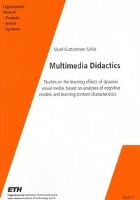- Start
- Multimedia Didactics
Multimedia Didactics
Angebote / Angebote:
This work presents a cognitive view on multimedia didactics, and offers a comprehensive analysis of relevant theories for information processing in a learning context. This work also presents relevant empirical research on the questions related to the learning effects of various media combinations. Finally, selected experiments, from the author's empirical research on actual questions related to learning effects of dynamic media and learning content analysis, are presented in detail. The theoretical analysis, the empirical reviews and presented research advocate a theory based approach to empirical research in this domain. Multimedia Didactics is examined from three perspectives:
The first part presents an overview of relevant cognitive theories and their employment in empirical multimedia research on the one hand and theoretical and applied framework for instructional design on the other hand. The selective synthesis of these two theoretical sections is a major contribution of this work.
The second part presents a selection of the author's own empirical research on multimedia didactics. Five experiments are presented in depth. Four experiments were designed to investigate the didactical conditions required for establishing a learning effect of dynamic visual media. In order to explore and test this issue the experiments also incorporated various static and dynamic media and their combinations (e.g. text, picture, voice, animation). The fifth experiment applies to both instructional design and multimedia design in the following way: It is necessary to analyse the learning content before applying an instructional strategy. Hence, learning content analysis could proceed by identifying a given set of learning content categories, for which favourable instructional strategies are already known. Furthermore, we suggest that multimedia design to some extent relies on characteristics of the learning content. Hence, learning content categories for this purpose must be identified. Consequently, experiment fi ve represents basic research related to the learning content analysis issue, as it aims at identifying reliable learning content categories for the mentioned purposes.
The third part of this work presents a synthesis of the theoretical state of the art, the implications for further research and multimedia design guidelines that are consistently supported in the literature.
Libri-Titel folgt in ca. 2 Arbeitstagen
